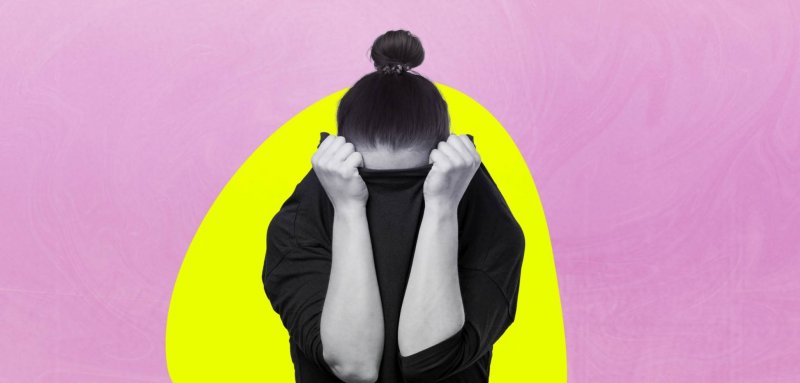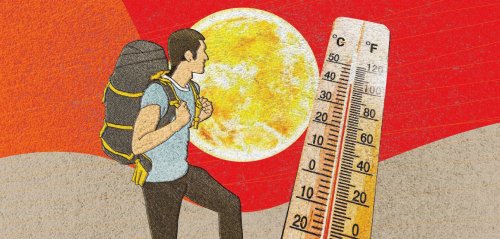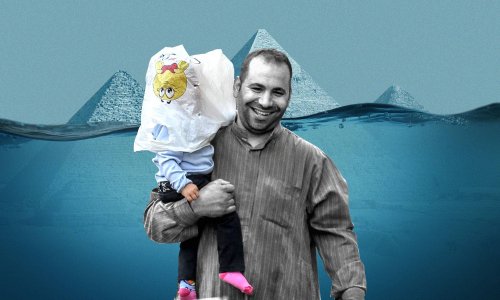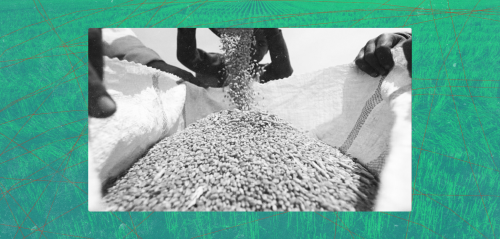"We don't want to bring a child into this burning world.." With these words, Rowaida Mahmoud, a 26-year-old woman who lives with her husband Sayed Ali, 35, in Egypt's Gharbia Governorate, summed up her situation to Raseef22.
Rowaida traveled with her husband to stay in Germany for two years as he completed his master's degree in mechanical engineering. She says that the unexpectedly hot European weather left them in a state of psychological turmoil and unease. The heat made them think long and hard about the future of children in this world, so they postponed the idea of having children indefinitely, and things remained like this even after their return to Egypt, as the weather had also become hot there, according to Rowaida.
This is not all that concerns Rowaida. She also said that she wants to contribute to reducing climate change disasters. She read that the increase in the world's population contributes to the exacerbation of the crisis and the psychological and economic pressures that follow, so she rejects the idea of having children now, or at least postpones it, and if it does happen, one child is enough. She concludes by saying that the climate issue has become her top priority, and she wants to contribute to reducing it, even if it costs her a lot.
"We don't want to bring a child into this burning world.."
"I've become afraid of getting married"
Sarah Ali, a 24-year-old living in a Cairo neighborhood, graduated two years ago from business school and is now working in a private sector company. Sarah says she is seriously considering not getting married.
"The main reason is the suffering I see on a daily basis as I watch my mother doing housework, preparing food three times a day in such hot weather, and doing all the cleaning at home like sweeping, wiping, and washing clothes and dishes, and there is no way for her to escape any of this. These are the responsibilities that she has been carrying for years, all on top of her work as a teacher in a public school," she says. Sarah then adds that she also suffers from the hot weather on a daily basis on her way to work and back home. When she gets home, she is "unable to even lift a straw", as she puts it, let alone getting married and having to take on the responsibility of the house like her mother!
Sarah disclosed to Raseef22 a few difficult situations that her mother has gone through and have made her hate the idea of marriage and childbearing, like having to go buy fruits, vegetables, and groceries for the house before she goes to work or on her way back. Her mother also has provide water for the family in the event of a water cut, an issue that has been happening a lot in the last period, and similarly has to meet the family's demands in the event of a power outage, whether because the weather is very hot or during heavy rain, all of which have been exacerbated by climate change.
While speaking with Raseef22, the young woman admitted that even if she does get married, the decision to have or adopt a child will not be an easy one for her, and it will be depending on the psychological state and economic situation of her and her husband.
Rowaida wants to contribute to reducing climate change disasters. She read that population increase contributes to the exacerbation of the crisis and the psychological and economic pressures that follow, so she rejects the idea of having children now
Young people are paying the price
A recent global climate change survey of 10,000 young people aged 16 to 25 across 10 countries showed that 60% are extremely worried about the future, and that 45% of the respondents have fears and concerns that affect their daily lives, while others believe that humanity is doomed and is heading towards extinction.
Some young people expressed feelings of anxiety, fear, and betrayal over the failure of governments so far to deal with climate change and find radical solutions.
In addition to the above, the report concluded that young people are afraid of the current climate changes, because of their impact on mental and physical abilities, and their exposure to fatigue and chronic stress, whether in extremely hot or cold weather, which makes them suffer and leaves them unable to carry out their duties towards their families. The survey also revealed that 4 out of 10 are hesitant to have children.
At the Arab level, a study published by the "Arab Youth Council for Climate Change" confirmed that young people in the Middle East and North Africa have the biggest share of the repercussions of climate change despite being preoccupied with political and social issues in the region more than climate issues. The study pointed out that climate change has a significant impact on the economic aspect and the rise in unemployment for those under the age of 35 to their highest rates in 2021. However, environmental awareness has increased among the youth of the region, according to another survey, and young people are looking forward to more climate initiatives to participate in, with 65% of youth in the UAE expressing their desire to take action to protect the environment.
"I am now free without any obligations"
Ahmad Mahrous, who lives in Dakahlia Governorate and turned 35 last week, says that he has become afraid of getting married and having children in light of the exorbitant prices. Due to his work as a manager of a large chain of stores in his town, he feels depressed on a daily basis when he sees couples coming in to buy their needs with prices that keep rising day after day.
Speaking to Raseef22, he points out that the high temperatures are a major reason for the increase in prices due to the spoiling and rotting of large quantities of cheese, milk, and legumes in stores, with no way to compensate for the losses other than raising the prices, and consequently the suffering of people in the first and foremost.
A significant portion of Arab youth have become hesitant to marry today due to fear of climate change
As for the reason for his reluctance to get married, the young man explained that he is now free to do whatever he wants, and he doesn't have any obligations towards a family that he would have to become fully responsible for in terms of food and drink. He is also not obligated to go out during the day in such hot weather in order to meet the needs of his future family, which makes him feel somewhat comforted.
In the same context, the effects of the climate have begun to permeate the personal lives of young people, affecting their working conditions on a broader scale, and thus increasing their fear of the future. Perhaps this is what happened to Mohammad Abdelqawi, 35, a construction worker in Sharqia Governorate.
Mohammad lost his older brother last year due to the heat. His brother, who used to work with him in the same field, suffered from a heat stroke while working in a building, and it turned into a fever that lasted about a week, from which he did not survive. He explains to Raseef22 that he also is no longer able to work for long hours and days in such hot weather, and he has indeed recently reduced his working hours.
When asked about marriage and childbearing, he says that he is no longer enthusiastic about the idea at all, as he has not worked in any profession other than construction his entire life, and that it has already become extremely tiring in such extreme weather during the summer and winter.
Fear of the future
Basant Ismail, a family and psychological counseling specialist, discussed this issue with Raseef22, stressing that a significant portion of Arab youth have become hesitant to marry today, and climate change is one of the most important reasons that push them to do so.
It is better to turn pathological anxiety into positive anxiety, strive to contribute to saving the world in every way, educate oneself by reading studies about the climate and applying them on the ground, and pay attention to useful individual initiatives
Ismail points out that this issue is thorny and complex and has become a reality that society used to overlook until its effects magnified and could no longer be ignored. Changing weather patterns have left a significant impact on crop damage, and consequently a rise in food prices. Citizens also find it difficult to adapt to their regular days, go to work, and perform their duties amidst high temperatures. The costs of marriage and making a family have become expensive and burdensome, which has made young people see it as more of a burden instead of the start of a new life.
The family expert advises that parents should stand by their children and help them in such difficult and new circumstances. She also advises young people not to be too affected by the direct effects and repercussions of climate change, like fires and floods.
She adds, "This does not mean ignoring the issue, but rather turning pathological anxiety into positive anxiety, along with striving to contribute to saving the world in every way, educating oneself by reading studies that talk about the climate and applying them on the ground, as well as paying attention to useful individual initiatives, such as planting trees on balconies and rooftops, which contributes to both the atmosphere and improves one's psychological state. Young people need to realize that their anxiety won't change anything in reality, but rather it's their positivity that will change a lot."
Raseef22 is a not for profit entity. Our focus is on quality journalism. Every contribution to the NasRaseef membership goes directly towards journalism production. We stand independent, not accepting corporate sponsorships, sponsored content or political funding.
Support our mission to keep Raseef22 available to all readers by clicking here!
Interested in writing with us? Check our pitch process here!







